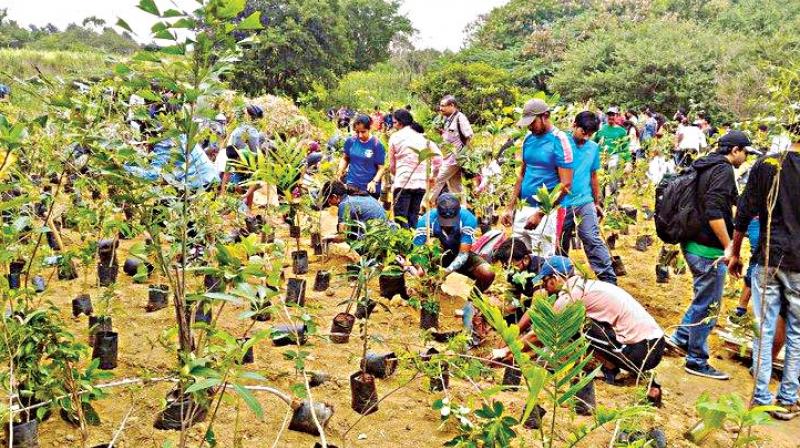Techies-turned-activists raise five mini-forests across Bengaluru
With over 10,000 volunteers, the NGO has planted over 70,000 trees across Karnataka.

Bengaluru: There is no denying that rapid development has taken its toll on the Garden City of India. Though climate change has affected us all, most of us do nothing but complain about it, but not Kapil Sharma and Durgesh Agrahari. The two Bengalureans, working in the corporate sector, were saddened by the state of affairs and decided to come together to make the Garden City green again.
They founded a volunteer group in 2007 called Say Trees with a handful of nature lovers from the city and started planting saplings in different zones of the city. The small group went on to become a full-fledged NGO in the summer of 2013 to 10,000 volunteers now.
Say Trees has planted over 70,000 saplings so far in the state and also some remote areas of Andhra Pradesh. They have planted 17,306 saplings in the city. “We saw the need to do something about the climate change. I remember I took a bike ride to the Western Ghats and when I spoke to the farmers, they said that rainfall in the monsoons had reduced from 45 days to a mere 10 days.
Climate change is talked about a lot, but we see the real change on the ground and instead of being just an armchair, we really wanted to be proactive,” remarked Durgesh. The organisation works with the BBMP, the Forest Department, the Army and other government agencies to achieve maximum effect and have as many hands as possible, he said.
The organisation recently planted 12,000 mango saplings in Anantapur district of Andhra Pradesh and hopes to repeat it in Karnataka. “We worked with about 42 farmers and we planted mango saplings in their fields so that they can have an additional income apart from their usual earnings. We hope to do more of this,” Durgesh said.
They have also created six mini-forests in the city, five of which were converted to green cover from dump yards. “You can see the forests in Yeshwanthpur, Kalyan Nagar and Ejipura. They were used as garbage dumps before, and now they contribute to the greenery of the city. We are working towards converting 500 acres of land altogether in the city in the near future.”
Apart from planting saplings, they also keep an eye on the plants. “Maintenance is very crucial. We cannot just plant saplings and turn away. We water them, remove unwanted grass and weeds, we do the tilling and organise plantation and maintenance drives every Saturday.” Planting of saplings starts in June and continues till September, when rains hit the city.

